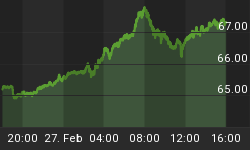There is an old adage on Wall Street that no one rings a bell at major market tops or bottoms. That may be true in normal times, but as many have noticed, we are now completely through the looking glass. In this parallel reality, Ben Bernanke has just rung the loudest bell ever heard in the foreign exchange and government debt markets. Investors who ignore the clanging do so at their own peril. The bell's reverberations will be felt by everyday Americans, whose lives are about to change in ways few can imagine.
While nearly every facet of America's economy has been devastated over the past six months, our national currency has thus far skipped through the carnage with nary a scratch. Ironically, the U.S dollar has been the beneficiary of the global economic crises which the United States set in motion. As a result, our economy has thus far been spared the full force of the storm.
This week the Federal Reserve finally made clear what should have been obvious for some time - the only weapon that the Fed is willing to use to fight the economic downturn is a continuing torrent of pure, undiluted, inflation. The announcement should be seen as a game changer that redirects the fury of the financial storm directly onto our shores.
In its statement, the Fed announced its intention to purchase an additional $1 trillion worth of U.S. treasury and agency debt. The purchases, of course, will be made with money created out of thin air through the Fed's printing presses. Few can doubt that they will persist with these operations until the economy returns to its former health. Whether or not this can ever be accomplished with a printing press alone has never been seriously considered. Bernanke himself admits that we are in uncharted waters, with no map or compass, just simply a hope that more dollars are the answer.
Rather than solving our problems, more inflation will only add to the crisis. Falling asset prices, the credit crunch, declining consumer spending, bankruptcies, foreclosures, and layoffs are all part of the necessary rebalancing of our economy. These wrenching movements, however painful, are the market's attempts to resolve the serious problems at the root of our bubble economy. Attempts to literally paper-over these problems will lead to disaster.
Now that the Fed has recklessly shown its hand, the mad dash to get out of Treasuries and dollars should not be far off. The more the Fed prints to buy bonds the less the dollar is worth. Holders of our debt (read China and Japan) understand this dynamic. We must expect that they will not only refuse to buy new bonds, but they will look to unload those bonds they already own.
Under normal circumstances, if creditors grew concerned that inflation was eating into their returns, the Fed would raise interest rates to entice them to buy. However, the Fed will avoid this course of action as it fears higher rates are too heavy a burden for our debt laden economy to bear. To maintain artificially low rates, the Fed will be forced to purchase trillions more debt then it expects as it becomes the only buyer in a seller's market.
Just last week, Chinese premier Wen Jiabao voiced concern about his country's massive investments in U.S. government debt. In the most unequivocal statement yet by the Chinese leadership on this issue, Wen made it plain that he was concerned with depreciation, not default. With his fears now officially confirmed by the Fed statement, we must wonder when the Chinese will finally change course.
There is a growing consensus that if China no longer wants to buy our bonds, we can simply print the money and buy them ourselves. This naïve view fails to consider the consequences implicit in such a change. When the Treasury sells bonds to China, no new dollars are printed. Instead, China prints yuan which it then uses to buy treasurers. This effectively allows America to export its inflation to China. However, now that we will be printing the money ourselves, the full inflationary impact will fall directly on us.
With such a policy in place, America has now become a banana republic. It won't be too long before our living standards reflect our new status. Got Gold?
For a more in depth analysis of our financial problems and the inherent dangers they pose for the U.S. economy and U.S. dollar, read my just released book "The Little Book of Bull Moves in Bear Markets." Click here to order your copy now.
For a look back at how I predicted our current problems read my 2007 bestseller "Crash Proof: How to Profit from the Coming Economic Collapse." Click here to order a copy today.
More importantly, don't wait for reality to set in. Protect your wealth and preserve your purchasing power before it's too late. Discover the best way to buy gold at www.goldyoucanfold.com. Download Euro Pacific's free Special Report, "Peter Schiff's Five Favorite Investment Choices for the Next Five Years", at http://www.europac.net/reports.asp. Subscribe to our free, on-line investment newsletter, "The Global Investor" at http://www.europac.net/newsletter/newsletter.asp. And now watch the latest episode of Peter's new video blog, The Schiff Report, at http://www.europac.net/videoblog.asp.















